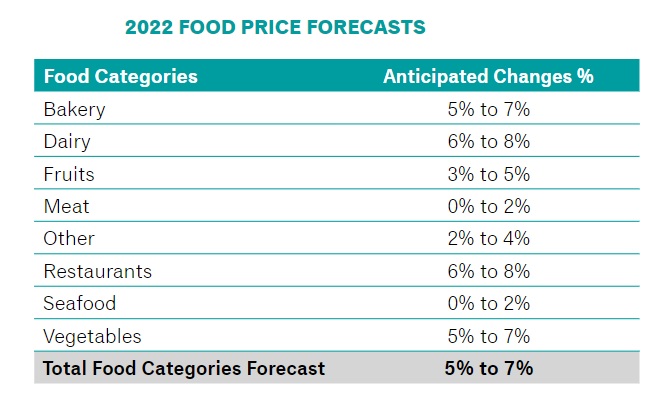CANADA’S FOOD PRICES TO RISE BY UP TO 7% IN 2022: REPORT
Residents of Canada are likely to see their food bills increase by an average of 5% to 7%, next year, with the dairy and restaurant categories rising the fastest at up to 8%, according to a new report. The average predicted increase is the highest since the inception of the report 12 years ago.
The study – Canada’s Food Price Report 2022 – from long-time research partners Dalhousie University and University of Guelph, as well as the University of Saskatchewan and the University of British Columbia (UBC) says that a number of issues are driving the hike.
Among the major factors are:
* Disrupted food supply chains
* Climate change and adverse weather effects
* Labour force challenges
* High inflation
* Transportation challenges.
Several of these issues affect multiple industry and business sectors, brought on by the Covid-19 pandemic and food is no different. “Food prices have been going up for some time, and there’s no turning back,” said Dr Sylvain Charlebois, project lead and director of the Agri-Food Analytics Lab at Dalhousie University.

Alyssa Gerhardt, a sociology and social anthropology PhD student at Dalhousie, added: “Supply chain disruptions and labour market challenges will persist in 2022. Covid-19 is still here and the food supply chain will continue to grapple with the cost of sanitation and PPE, high transport costs and reduced maritime capacity.”
Only two categories escape big increases
The hike in dairy prices is informed by a recent review of farm gate milk prices conducted by the Canada’s Dairy Commission. It found that production costs due to the pandemic – particularly for feed, energy and fertilizer, milk processing – have exceeded farm gate revenues. Therefore prices will increase.
The least affected categories are meat and seafood, which are both predicted to rise by between 0% and 2%. Although consumer are motivated to pay more based on health and environmental factor, or to support local food suppliers, a worrying trend is the retail cost of vegetables, set to increase by 5% to 7% which will affect the less well off.
Dr Kelleen Wiseman, UBC campus lead for the report, said: “From a public health perspective consumers might be tempted to reduce consumption of fresh and mainstream vegetables. Options are to select alternative vegetables or frozen vegetables which can provide high nutritional value at a lower price point.”
Join us at SIAL Paris as exhibitor Join us at SIAL Paris as visitor
